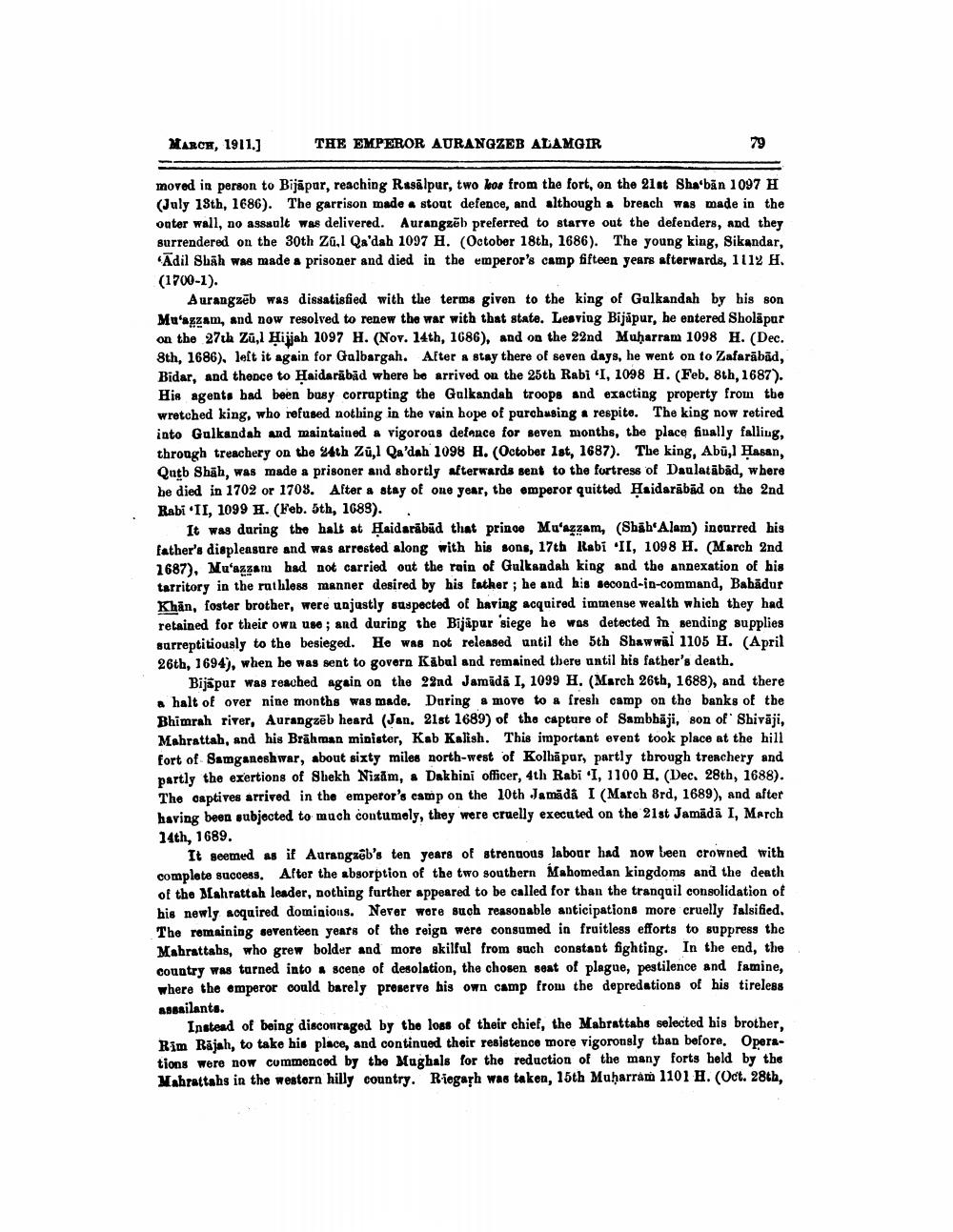________________
MARCH, 1911.)
THE EMPEROR AURANGZEB ALAMGIR
moved in person to Bijāpar, reaching Rasālpur, two los from the fort, on the 21st Sha'bån 1097 H (July 18th, 1686). The garrison made a stout defence, and although a breach was made in the outer wall, no assault was delivered. Aurangzēb preferred to starve out the defenders, and they surrendered on the 30th 20,1 Qa'dah 1097 H. (October 18th, 1686). The young king, Sikandar, Adil Shāh was made a prisoner and died in the emperor's camp fifteen years afterwards, 1112 H. (1700-1).
Aurangzeb was dissatisfied with the terms given to the king of Gulkandah by his son Mu'azzam, and now resolved to renew the war with that state. Leaving Bijapur, he entered Sholapar on the 27th Zül Hijjah 1097 H. (Nov. 14th, 1986), and on the 22nd Muharram 1098 H. (Dec. 8th, 1686), left it again for Galbargah. After a stay there of seven days, he went on to Zafarābād, Bidar, and thence to Haidarābād where be arrived on the 25th Rabi 'I, 1098 H. (Feb. 8th, 1687). His agents bad been busy corrupting the Gulkandah troops and exacting property from tbe wretched king, who refused nothing in the vain hope of purchasing a respite. The king now retired into Galkandah and maintained a vigorous defence for seven months, the place finally falling, through treachery on the 24th Zül Qa'dah 1098 H. (October 1st, 1687). The king, Abul Hasan, Qutb Shāh, was made a prisoner and shortly afterwards sent to the fortress of Daulatābād, where he died in 1702 or 1708. After a stay of one year, the emperor quitted Haidarābād on the 2nd Rabi II, 1099 H. (Feb. 5th, 1989).
It was during the halt at Haidarābād that prince Mu'azzam, (Shah Alam) incurred his father's displeasure and was arrested along with his sons, 17th Rabi 'II, 1098 H. (March 2nd 2687), Muazzam had not carried out the rain of Gulkandah king and the annexation of his tarritory in the rathless manner desired by his father ; he and his second-in-command, Bahadur Khān, foster brother, were unjustly suspected of having acquired immense wealth which they had retained for their own use; and during the Bijapur siege he was detected in sending supplies Barreptitiously to the besieged. He was not released until the 5th Shawwal 1105 H. (April 26th, 1694), when he was sent to govern Käbal and remained there until his father's death.
Bijäpur was reached again on the 22nd Jamāda I, 1099 H. (March 26th, 1688), and there halt of over nine months was made. During a move to a fresh camp on the banks of the Bhimrah river, Aurangzēb heard (Jan, 21st 1689) of the capture of Sambhaji, son of Shivaji, Mahrattah, and his Brāhman minister, Kab Kalish. This important event took place at the hill fort of Samganeshwar, about sixty miles north-west of Kolhapur, partly tbrough treachery and partly the exertions of Shekh Nizam, a Dakbini officer, 4th Rabi 'I, 1100 H. (Dec. 28th, 1688). The captives arrived in the emperor's camp on the 10th Jamada I (March 8rd, 1689), and after having been subjected to much contumely, they were cruelly executed on the 21st Jamäda I, March 14th, 1689.
It seemed as if Aurangzob's ten years of strengous labour had now been crowned with complete success. After the absorption of the two southern Mahomedan kingdoms and the death of the Mahrattah leader, nothing further appeared to be called for than the tranquil consolidation of his newly Roquired dominions. Never were such reasonable anticipations more cruelly falsified, The remaining seventeen years of the reign were consumed in fruitless efforts to suppress the Mahrattabs, who grew bolder and more skilful from such constant fighting. In the end, the country was tarned into a scene of desolation, the chosen seat of plague, pestilence and famine, where the emperor could barely preserve his own camp from the depredations of his tireless assailants.
Instead of being discontraged by the loss of their chief, the Mabrattabs selected his brother, Rim Rajah, to take his place, and continued their resistence more vigoronsly than before. Operations were now commenced by the Mughals for the reduction of the many forts held by the Mahrattahs in the western hilly country. Riegarh was taken, 15th Muharram 1101 H. (Oct. 28th.




